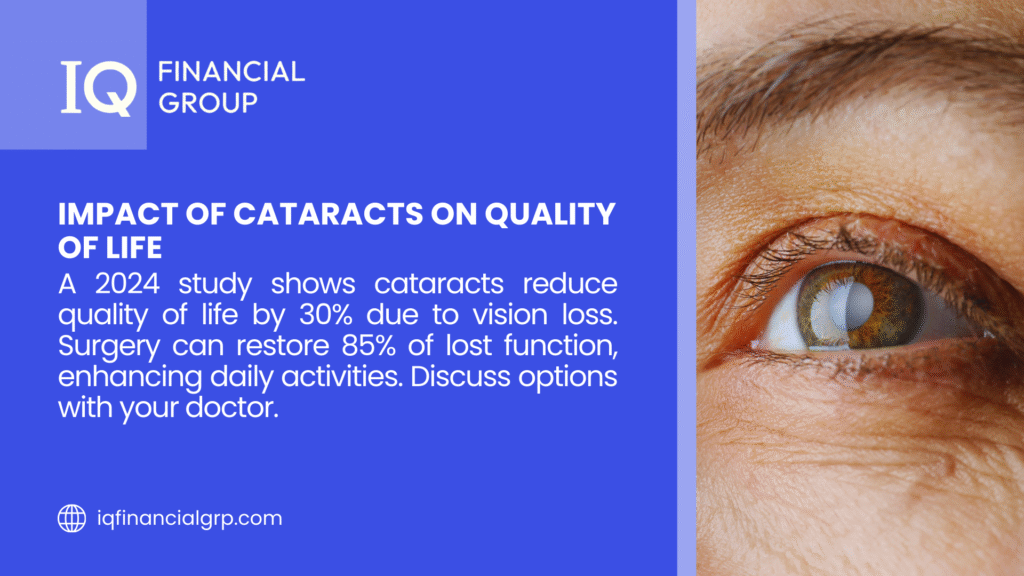Are you having cloudy vision that’s making it hard to read the morning paper or see street signs while driving? That’s probably cataracts. Millions of Americans deal with this eye condition, especially after hitting 60, but cataract surgery works incredibly well. The big question everyone asks, though, is: Does health insurance cover cataract surgery?
Most of the time, yes. Health insurance plans usually cover cataract surgery when doctors say it’s medically necessary. But figuring out exactly what’s covered, how much patients might still owe, and what hoops to jump through – well, that’s where things get a bit more complicated.
How Insurance Views Cataract Surgery
Insurance companies don’t treat cataract surgery like a cosmetic procedure or elective surgery. They see it as medically necessary, which is huge because it means the surgery gets covered under regular medical benefits instead of being considered optional.
Getting approval isn’t automatic. Insurance wants proof that cataracts are really messing with someone’s life. Eye doctors must demonstrate that glasses or contacts will not resolve the issue and that these cataracts are causing difficulties with everyday tasks, such as driving safely or reading without squinting.
What gets covered usually includes the actual surgery, what the surgeon charges, the costs for using the surgery center or hospital, and basic lens implants. The catch is that different insurance plans have different rules about how much they’ll pay and what patients end up responsible for.
Medicare’s Take on Cataract Surgery
Medicare Part B jumps in to cover cataract surgery when doctors say it’s medically necessary, which happens in most cases where cataracts are seriously affecting vision.
Here’s how it breaks down: Medicare pays 80% of what they consider the approved amount after patients hit their yearly deductible. That leaves patients paying the other 20%, plus any extra if their surgeon doesn’t accept Medicare’s payment rates.
For most Medicare folks, this works out to somewhere between a few hundred to over a thousand dollars out of their own pocket. The exact amount depends on surgeon fees and whether patients have additional insurance to help with costs. Medicare Advantage plans sometimes offer different deals – maybe lower copays, but they might require using specific doctors in their network.
There’s one more thing Medicare covers that most people don’t know about: they’ll pay for one pair of glasses or contacts after cataract surgery, but only if the surgeon doesn’t put in an artificial lens during surgery. That’s pretty rare these days, though.
Private Insurance and Job-Based Plans
Private insurance coverage for cataract surgery varies way more than Medicare, but most decent plans include this under their medical coverage. How much patients pay depends on their deductible amount, copay or coinsurance percentages, and whether their surgeon and surgery center are in the insurance network.
Most employer health plans treat cataract surgery like any other outpatient procedure. Patients usually visit their specialist copay for appointments, work through their deductible if they haven’t hit it yet, then pay their share of the surgery costs based on their plan’s coinsurance.
Some plans require doctors to get approval before scheduling surgery. This means submitting paperwork that proves the surgery is medically necessary before the insurance company gives the green light. This approval dance usually takes anywhere from a few days to a couple of weeks, so starting early makes sense.
Getting a handle on what does health insurance cover overall really helps when trying to figure out these specific surgery questions.
What’s Covered and What Costs Extra
| Usually Covered by Insurance | Often Means Extra Out-of-Pocket Costs |
| The surgery itself | Fancy lens upgrades (multifocal, toric) |
| What the surgeon charges | Laser-assisted surgery |
| Basic artificial lenses | Extra testing beyond the standard |
| Surgery center fees | Premium surgical methods |
| Eye exams before surgery | Designer lens brands |
| Follow-up visits after surgery | Doing both eyes the same day |
The biggest surprise for most patients comes with lens upgrades. Insurance typically covers basic lenses that give clear vision at one distance – usually for seeing things far away. Want lenses that might let someone ditch glasses completely? Those multifocal lenses or special ones for astigmatism? That’s usually an extra $1,000 to $4,000 per eye out of pocket.
Same story with laser-assisted cataract surgery. Some surgeons really push this as being more precise than traditional methods, but insurance often sees it as an upgrade and won’t cover the extra cost.

What Makes Insurance Say Yes or No
Insurance companies look at several things when deciding whether to approve cataract surgery. The main thing is how well someone can see – eye doctors have to document exactly how much the cataracts are affecting vision. Most insurance companies have specific vision thresholds that need to be met before they’ll approve surgery.
Doctors also document how cataracts are affecting daily life through patient interviews and sometimes formal questionnaires. Insurance wants to see real functional problems, not just minor vision changes that new glasses could fix.
Timing matters too. Some patients want surgery the moment cataracts show up, but insurance companies usually want to see significant vision impairment before they’ll pay. Jumping into surgery too early, before meeting those medical necessity requirements, could mean getting stuck with the whole bill.
Age usually doesn’t matter much for approval since cataracts can happen to younger people because of injuries, medications, or other health issues. But the reason cataracts developed might affect how insurance looks at the case.
Working Through Pre-Authorization
When insurance requires approval before surgery, the eye surgeon’s office usually handles the paperwork. They send over medical records, current vision test results, and a letter explaining why surgery is necessary.
This approval process typically takes about a week to ten business days, sometimes longer if insurance wants more information. Smart move during this time? Call the insurance company directly to double-check benefits and find out exactly what costs to expect.
Not all insurance plans require pre-approval for cataract surgery – some treat it like any other covered medical procedure. Still worth confirming this before scheduling surgery, though, just to avoid any nasty surprises when the bills arrive.
Keep track of everything during this process. Write down reference numbers from phone calls, keep copies of paperwork, and get written confirmation when coverage gets approved. This stuff can be a lifesaver if billing problems pop up later.

How Much Does Insurance Cover?
Even with insurance coverage, cataract surgery often means shelling out some serious cash. Knowing what to expect helps with planning and making smart decisions about care.
Medicare patients typically pay $500 to $1,500 per eye out of pocket, depending on supplemental insurance and surgeon fees. Private insurance patients might pay anywhere from $300 to $3,000 per eye, mostly based on their deductible and how much their plan covers.
Thinking about those premium lens upgrades or laser surgery? Tack on another $1,000 to $4,000 per eye for those extras. Insurance won’t cover these upgrades, but some patients decide the better vision is worth the extra money.
Lots of surgery centers and eye practices offer payment plans or financing for patients facing big out-of-pocket costs. Some even offer package deals that can be easier to predict than getting separate bills for every part of the process.
Special Cases Worth Knowing About
Some situations can change how insurance handles cataract coverage. Cataracts from workplace injuries might qualify for workers’ compensation, which could cover everything without the usual deductibles and copays. Veterans might get coverage through VA benefits depending on their service connection.
Patients with other eye problems like glaucoma or diabetic eye disease, might get additional procedures covered during cataract surgery. This can complicate billing, though.
Having both Medicare and private insurance (“dual coverage”) can significantly affect out-of-pocket costs, but understanding which one pays first and how they work together is key. Usually, employer insurance pays first for active workers, while Medicare becomes secondary for retirees.
Other Options When Insurance Falls Short
When insurance doesn’t cover surgery or costs are still too high, there are other routes to explore. Community health centers and teaching hospitals sometimes offer discounted services based on income. Some charitable organizations help with eye surgery costs, too.
Flexible spending accounts (FSAs) or health savings accounts (HSAs) let patients pay for surgery with pre-tax money, which effectively reduces the total cost. Planning ahead and maxing out contributions during open enrollment can provide significant tax savings.
Some patients look into medical tourism, though this requires careful thought about quality, follow-up care, and potential complications that regular insurance might not cover once patients return home.
Vision insurance helps with routine eye care, but typically doesn’t cover cataract surgery since it’s considered medical rather than vision-related. Vision insurance might help with upgraded frames or lenses if glasses are still needed after surgery, though.
Making Smart Moves
Knowing that most insurance covers cataract surgery when medically necessary provides peace of mind, but navigating coverage specifics requires attention to individual plan details. Minimizing costs and avoiding surprises comes down to good preparation and clear communication with both doctors and insurance companies.
Start by reviewing insurance benefits carefully – deductibles, coinsurance amounts, and any pre-approval requirements. Call the insurance company directly to verify coverage and get written confirmation of benefits.
When picking a surgeon, prioritize in-network providers to keep costs down, but don’t sacrifice quality for small savings. Ask detailed questions about all potential fees, including charges for any premium upgrades worth considering.
Navigate the Health Insurance Coverage
Understanding health insurance coverage for procedures like cataract surgery can feel overwhelming.
IQ Financial Group helps people find the right health insurance coverage that fits their needs and budget. Our experienced team guides you through plan comparisons, explains coverage details, and ensures informed decisions about healthcare protection.
Don’t leave health and financial security to chance. Contact IQ Financial Group today to speak with our insurance specialists. We’ll help find comprehensive coverage that protects against unexpected medical costs while ensuring access to needed care.

